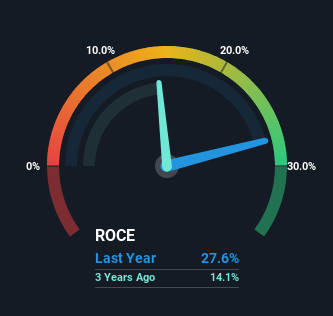Why The 28% Return On Capital At Consensus Cloud Solutions (NASDAQ:CCSI) Should Have Your Attention
What are the early trends we should look for to identify a stock that could multiply in value over the long term? One common approach is to try and find a company with returns on capital employed (ROCE) that are increasing, in conjunction with a growing amount of capital employed. Basically this means that a company has profitable initiatives that it can continue to reinvest in, which is a trait of a compounding machine. Speaking of which, we noticed some great changes in Consensus Cloud Solutions' (NASDAQ:CCSI) returns on capital, so let's have a look.
What Is Return On Capital Employed (ROCE)?
Just to clarify if you're unsure, ROCE is a metric for evaluating how much pre-tax income (in percentage terms) a company earns on the capital invested in its business. To calculate this metric for Consensus Cloud Solutions, this is the formula:
Return on Capital Employed = Earnings Before Interest and Tax (EBIT) ÷ (Total Assets - Current Liabilities)
0.28 = US$151m ÷ (US$621m - US$74m) (Based on the trailing twelve months to March 2024).
Therefore, Consensus Cloud Solutions has an ROCE of 28%. In absolute terms that's a great return and it's even better than the Software industry average of 7.5%.
Check out our latest analysis for Consensus Cloud Solutions
Above you can see how the current ROCE for Consensus Cloud Solutions compares to its prior returns on capital, but there's only so much you can tell from the past. If you'd like, you can check out the forecasts from the analysts covering Consensus Cloud Solutions for free.
How Are Returns Trending?
Consensus Cloud Solutions has not disappointed in regards to ROCE growth. The data shows that returns on capital have increased by 81% over the trailing four years. That's a very favorable trend because this means that the company is earning more per dollar of capital that's being employed. Interestingly, the business may be becoming more efficient because it's applying 57% less capital than it was four years ago. If this trend continues, the business might be getting more efficient but it's shrinking in terms of total assets.
The Bottom Line
In a nutshell, we're pleased to see that Consensus Cloud Solutions has been able to generate higher returns from less capital. And since the stock has fallen 43% over the last year, there might be an opportunity here. So researching this company further and determining whether or not these trends will continue seems justified.
One more thing: We've identified 3 warning signs with Consensus Cloud Solutions (at least 2 which are potentially serious) , and understanding them would certainly be useful.
If you want to search for more stocks that have been earning high returns, check out this free list of stocks with solid balance sheets that are also earning high returns on equity.
Have feedback on this article? Concerned about the content? Get in touch with us directly. Alternatively, email editorial-team (at) simplywallst.com.
This article by Simply Wall St is general in nature. We provide commentary based on historical data and analyst forecasts only using an unbiased methodology and our articles are not intended to be financial advice. It does not constitute a recommendation to buy or sell any stock, and does not take account of your objectives, or your financial situation. We aim to bring you long-term focused analysis driven by fundamental data. Note that our analysis may not factor in the latest price-sensitive company announcements or qualitative material. Simply Wall St has no position in any stocks mentioned.
Have feedback on this article? Concerned about the content? Get in touch with us directly. Alternatively, email editorial-team@simplywallst.com

 Yahoo Finance
Yahoo Finance 
